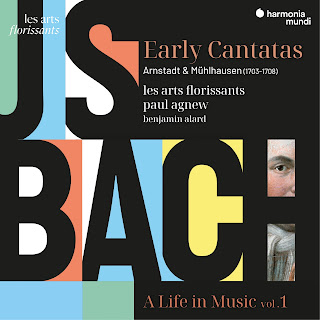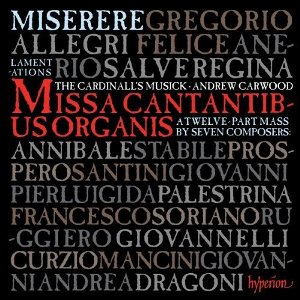JS BACH 'A Life in Music Vol 1'
Johann Sebastian Bach: A Life in Music (Vol. 1). Early Cantatas. Arnstadt & Mühlhausen (1703-1708)
Les Arts Florissants, Paul Agnew, Feat. Benjamin Alard
Les Arts Florissants, Paul Agnew, Feat. Benjamin Alard
HAF8905364
I hail the advent of a new miniseries from Paul Agnew and Les Arts Florissants, having already found their previous surveys of Monteverdi and Gesualdo quite brilliant. This is also a confident entry into a strong market for what Agnew calls Bach’s ‘extraordinary and deeply uncompromising music’. Susan McClary’s note is a superb guide for all audiences. Three of Bach’s early cantatas are presented here, opening with No 4, Christ lag in Todesbanden, followed with the setting by Johann Kuhnau (1660-1722). In between the cantatas are organ works, including chorale arrangements, played by Benjamin Alard in Saint-Vaast, Béthune. In terms of forces, Les Arts Florissants follow notes for a performance in Mühlhausen using four solo singers and four chorus voices – concertists and ripienists.
In Cantata No 4, after a pleasingly sombre Sinfonia, Bach’s opening chorale variation is alarmingly fast, with some rather manic trills in the upper voice. The duet ‘Den Tod niemand zwingen kunnt’, however, is immaculate and glassy‑toned as sung by Miriam Allen and Thomas Hobbs but the gapped chorale for solo tenor, ‘Jesus Christus, Gottes Sohn’, fails to sparkle. Compared to Andrew Parrott’s dazzling solo-violin version (7/94), anyone performing with unison violins feels too careful for me. The sumptuous antique lament for bass is sung with spacious wonderment by Edward Grint; I don’t normally like it so slow but it’s vivid and pictorial, and just gorgeous in this performance. What a shame the final chorus also feels rushed.
[...]
These are beautiful, text-centred performances, and while I find several movements too fast for my taste, they are always engaging. There are some extraordinarily good solos throughout, and I keenly anticipate the next volume.
For the full text of this review please click here: Gramophone June 2024
I hail the advent of a new miniseries from Paul Agnew and Les Arts Florissants, having already found their previous surveys of Monteverdi and Gesualdo quite brilliant. This is also a confident entry into a strong market for what Agnew calls Bach’s ‘extraordinary and deeply uncompromising music’. Susan McClary’s note is a superb guide for all audiences. Three of Bach’s early cantatas are presented here, opening with No 4, Christ lag in Todesbanden, followed with the setting by Johann Kuhnau (1660-1722). In between the cantatas are organ works, including chorale arrangements, played by Benjamin Alard in Saint-Vaast, Béthune. In terms of forces, Les Arts Florissants follow notes for a performance in Mühlhausen using four solo singers and four chorus voices – concertists and ripienists.
In Cantata No 4, after a pleasingly sombre Sinfonia, Bach’s opening chorale variation is alarmingly fast, with some rather manic trills in the upper voice. The duet ‘Den Tod niemand zwingen kunnt’, however, is immaculate and glassy‑toned as sung by Miriam Allen and Thomas Hobbs but the gapped chorale for solo tenor, ‘Jesus Christus, Gottes Sohn’, fails to sparkle. Compared to Andrew Parrott’s dazzling solo-violin version (7/94), anyone performing with unison violins feels too careful for me. The sumptuous antique lament for bass is sung with spacious wonderment by Edward Grint; I don’t normally like it so slow but it’s vivid and pictorial, and just gorgeous in this performance. What a shame the final chorus also feels rushed.
[...]
These are beautiful, text-centred performances, and while I find several movements too fast for my taste, they are always engaging. There are some extraordinarily good solos throughout, and I keenly anticipate the next volume.
For the full text of this review please click here: Gramophone June 2024



Comments
Post a Comment